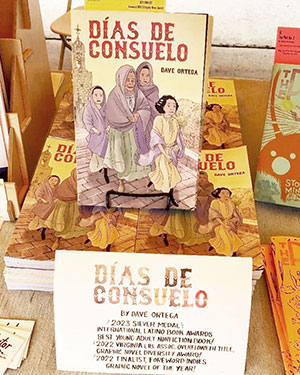
Dave Ortega’s comic art illuminates his family’s history as immigrants from Mexico.
By Mina Rose Morales
Mexican-American comic book writer and illustrator Dave Ortega narrates in Días de Consuelo his family’s experience during the Mexican Revolution. It recounts his grandmother’s childhood growing up in Mexico while the revolution was unfolding. He revisits the ongoing conversation the U.S. is having about the border and immigration. Ortega a native from El Paso, Texas is a Somerville transplant. While living in Somerville, he interviewed his grandmother for Días de Consuelo.
The comic begins with an image of Ortega conversing with his grandmother over the phone while living in Somerville. He asks her what she remembers about the war. She describes it as very bad. She goes on to describe the pivotal moment in their family that changed their history forever.
“We crossed into the U.S. in 1925,” said Consuelo.
From then on, Consuelo goes into detail explaining everything that led up to the family’s decision to leave their homeland. The revolution drove them out and brought them to Ortega’s hometown: El Paso. Throughout his comic, Ortega briefly pauses the story to offer history lessons about the revolution and to explain his family dynamics before resuming the main narrative.
“I did not have a childhood,” recalls his grandmother.
Readers learn through one of Ortega’s explanation pages that his great-grandfather was lost because of the war. They never found him despite his great-grandmother’s efforts to look for him. His grandmother describes how it was growing up without a father because of the war. She explains that her father a once warm musician turned cold by the war and his new life in the U.S. Through these details, readers understand the impact war has on families and its role in triggering one of the earliest waves of Mexican immigration into the U.S. In a way, Ortega’s details help readers sympathize with immigrants, especially children.
He also includes other barriers Mexican immigrants faced upon arrival: “El Paso was enjoying a long boom phase since before the turn of the century and the new Anglo population erected [grand neo-classical buildings] in their determination to claim the city as their own and erase Mexican architecture.”
Ortega concludes his comic with an image of him returning to El Paso. He refers to his family’s immigration story as devout Mexicans at the end of a pilgrimage.















Reader Comments